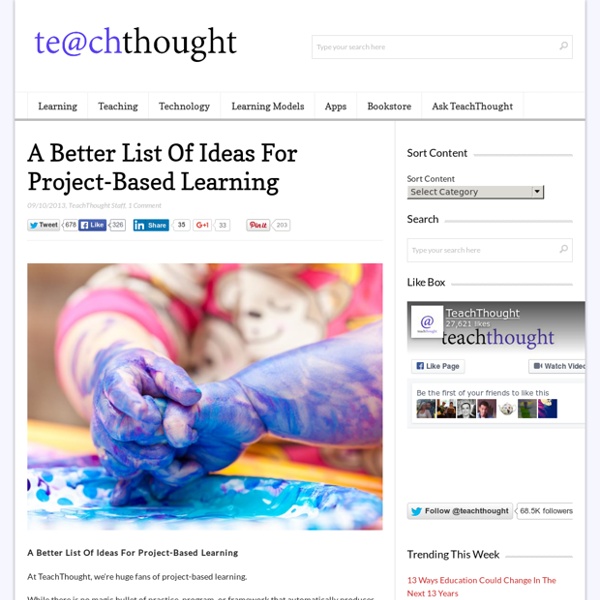Ideas for PBL

High Tech High - Project Based Learning
Seven Successful PBL Projects In March 2005 High Tech High received a $250,000 grant from the California Department of Education to disseminate project-based learning methods to teachers in non-charter public schools. As part of the project, High Tech High teachers have documented successful projects to share with collaborating teachers from local districts and across the HTH network. The current volume presents the fruits of these labors. The aim is simple: to offer practitioners useful, easily adaptable models of real projects. This New House How does human habitation affect the environment? learn more » Millionaire How can an idea be transformed into a product that could make us millions? learn more » San Diego Field Guide How can we be better environmental stewards of the San Diego Bay? learn more » Urban Art How do math and science influence artistic expression? learn more » Vietnam Project learn more » Drug Project How do drugs impact your body, your family, your community, and your world?
CASES Online: Creating Active Student Engagement in the Sciences
CASES Online is a collection of investigative lessons, or "cases," for K-12 and undergraduate science education. Using principles of Problem-Based Learning and Investigative Case-Based Learning (and related student-centered pedagogies), our cases are designed to engage students in exploring the science behind real-world problems. Our cases address a variety of learning objectives across the sciences and mathematics. Although our K-12 cases were designed for use in Georgia and meet our state education standards, we have also included the relevant National Science Education Standards. CASES Online is designed to be used by K-12 and undergraduate science educators. By searching our collection, educators can find cases appropriate to their grade levels, subjects, and topics of interest. Database/Interface/Application Design and Development by: Lee Clontz, Lead Multimedia Developer, Academic and Administrative Information Technology
Curriculum.htm
Curriculum for the 21st Century A curriculum for the 21st century has certain critical attributes; it is interdisciplinary, project-based, relevant, rigorous and real-world. Even if you teach a single course, for example - Algebra, Botany, 4th grade Social Studies or 8th grade Spanish - you can still design and deliver a curriculum that is 21st century! Teachers today are stressed by the current state of affairs in education, and many feel that they do not have the time to design and deliver a 21st century curriculum. They feel pressured to teach to the test, putting their students and themselves through a regimen of memorizing huge amounts of facts so that they can pass their standardized tests. Fortunately, we have examples of many classrooms and schools around the country and the world who are demonstrating phenomenal success by implementing a 21st century curriculum. This web site is a continually evolving source of information and ideas. Need More Information?
Twenty Tips for Managing Project-Based Learning
In honor of Edutopia's 20th anniversary, we're producing a series of Top 20 lists, from the practical to the sublime. 20 Tips for Managing Project-Based Learning 1. 2. 3. 4. 5. 6. 7. 8. 9. 10. 11. 12. 13. 14. 15. 16. 17. 18. 19. 20. Bonus! A quick note on these tips: There is no real silver bullet to get every single kid under the sun engaged in your classroom, but good teachers use all the strategies they can muster.
Related:
Related:



